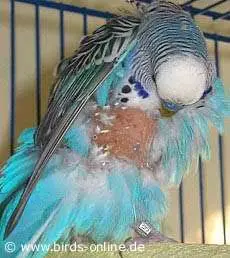If you plan on caring for a parakeet, or if you already have one under your care, you must now that like other animals, these birds get sick, too. There are many signs that you can look for to know whether these birds are not feeling well. The thing to prepare for is that these birds can quickly deteriorate if these birds are not tended to when they are sick right away. You should familiarize yourself with all of these things so that you can respond quickly when these signs show up.
First Sign: Parakeet Damaging Its Feathers
- Educate yourself about the destructive behavior of a parakeet, particularly damaging its feathers.
Skin and feather damage can happen to birds over time, and there are several possible causes. These include:
- Boredom – With a lack of mental stimulation, birds will have nothing to do and feel bored. Picking at these feathers is a form of the distraction of these birds.
- Illness – There can be an underlying medical condition that can cause feather plucking and feather loss.
- Diet – If this bird is not getting a diet with balanced nutrition, it can resort to feather plucking.
- Stress – Stress can come from a pet, person, and habitat. It can come from overly large perches, too small perches, noisy environment, busy cage, lack of exercise, and a lack of chewing toys.
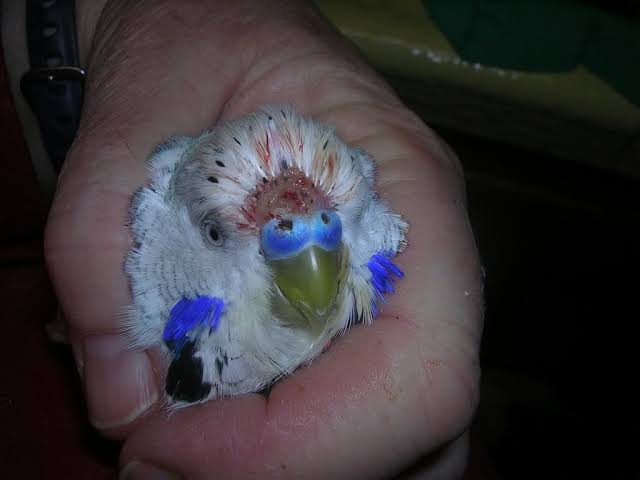
2. Look for some signs of mites.
If the birds have feathers that are thin and patchy, it can be a symptom of the bird having some mites. Some symptoms include:
- Clicking noises
- Crusted or scaly skin around the eyes, beaks, and legs
- Red lesions on the bird’s skin
- Restless behavior, especially at night
- Tiny moving black and red specks
3. Consult your trusted avian veterinarian
It is very important to rule out any possible illnesses first, before considering other causes of feather plucking behaviors. Also, unless you are a bird expert, it can be tiring and difficult to diagnose a bird’s illness.
Second Sign: Bird’s Behavioral Changes
- You should be alert about any changes in the eating and drinking habits of your pet bird.
If you notice that your bird fails to eat the food that you provide nor drink from their water bowls, you should take this as a very disturbing and troubling health problem symptom. The bird must be brought to an avian veterinarian immediately.
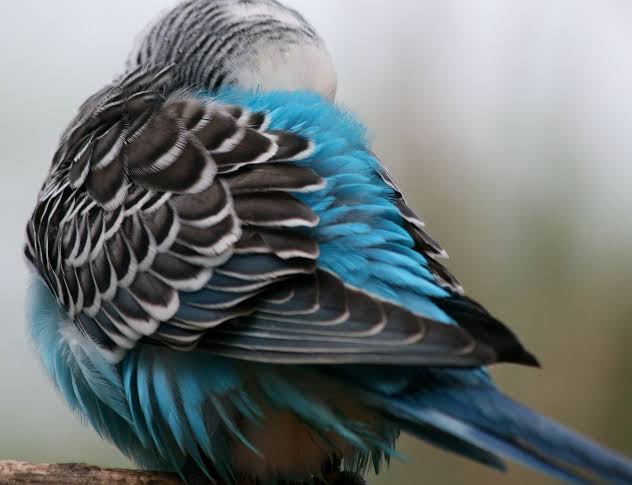
2. If your parakeet is suffering from lethargy, this is a definite sign of sickness.
Lethargy can be accompanied by huddling low on the bird’s perch, puffing up their feathers, as well as breathing heavily. Additionally, the bird may show some of these signs:
- A lack of activity or a strange new posture
- Changes to its singing, or a lack of singing
- Continuous feather-ruffling
- Failure to preen itself
- Falling off its perch
- Hanging from the cage by its beak rather than perching.
- Having seizures or trembling
- Sitting in the corner of the cage or low in the cage
- Sleeping a lot
- Walking in circles
- Weakness
- Watch out for your bird’s aggression
A parakeet that is feeling normally placid and happy may suddenly show aggressive behavior, like snapping, if they are feeling ill and painful.
Third Sign: Too Cold and Too Hot Temperatures
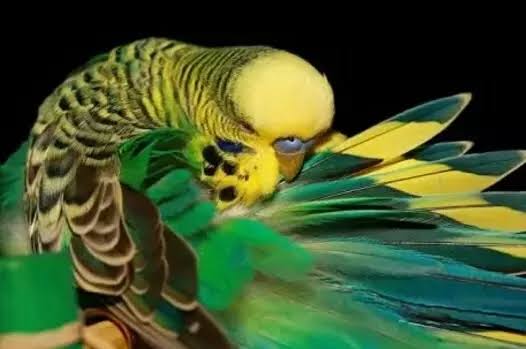
- If the room is too hot, there is a high chance that the parakeet is also feeling too hot.
Birds do not have the ability to sweat, so they utilize other forms of releasing heat from their bodies. Some common signs that the parakeets may be too warm include the following signs:
- Flared and red nares or nasal openings
- Hot beak
- Hot feet
- Panting, which can be defined as a rapid breathing or more breaths per minute than usual – This is a very serious sign of overheating that needs immediate veterinary attention, first by phone, then by a visit.
- Spreading its wings out
You should note that these symptoms also show up if the bird is suffering from a simple fever or a more serious respiratory distress. Therefore, should your bird feel too warm, bring it to the vet right away.
2. If the room is too cold, there is a high chance that the parakeet is feeling cold, too.
Some common signs that the parakeets are feeling too warm are:
- Fluffing out its feathers
- Huddling or scrunching over its feet to keep them warm
- Sitting in a corner or finding a hiding spot possible to get away from a draft
Fourth Signs: Other Symptoms That A Parakeet Is Sick
- Check the parakeet’s feces.
- Bird droppings come with a solid portion for feces, mixed with chalky white urates and their clear urine.
- Normal bird droppings must not have any smell.
- If the droppings are different in shape, color, smell, and consistency, something is wrong with your pet bird.
- Green or yellow coloration in the parakeet’s droppings are signs that there might be liver disease.
- Red or black coloration in the parakeet’s droppings are signs that there might be internal bleeding.
- Liquid feces showing up most probably mean that the bird has diarrhea.
- Look for some discharge.
- There can be discharge appearing from a bird’s eyes, nostrils, and crusted areas that show that the bird is feeling ill.
- Feel out for some lumps or swollen parts throughout the bird’s body.
- Lumps and bumps are immediate health concerns, which means that you should go and set an appointment with your trusted veterinarian right away.
- Be alert to any form of regurgitation or vomiting.
- Vomiting is a sure sign that a bird is feeling ill.
- Your bird may shake their head from side to side and expel whole seeds if it is regurgitating.
- If the bird is vomiting, the head appears wet and will spew out a mixture of seed and mucous.
- Check the eyes of your pet parakeet.
- If the eyes of your parakeet appear cloudy, changing colors, droopy, and sunken, this means that your bird has poor health conditions and is suffering from a serious illness. Do not forget that a healthy parakeet will have alert and clear eyes.
Before You Go: Homecare Tips For A Sick Parakeet
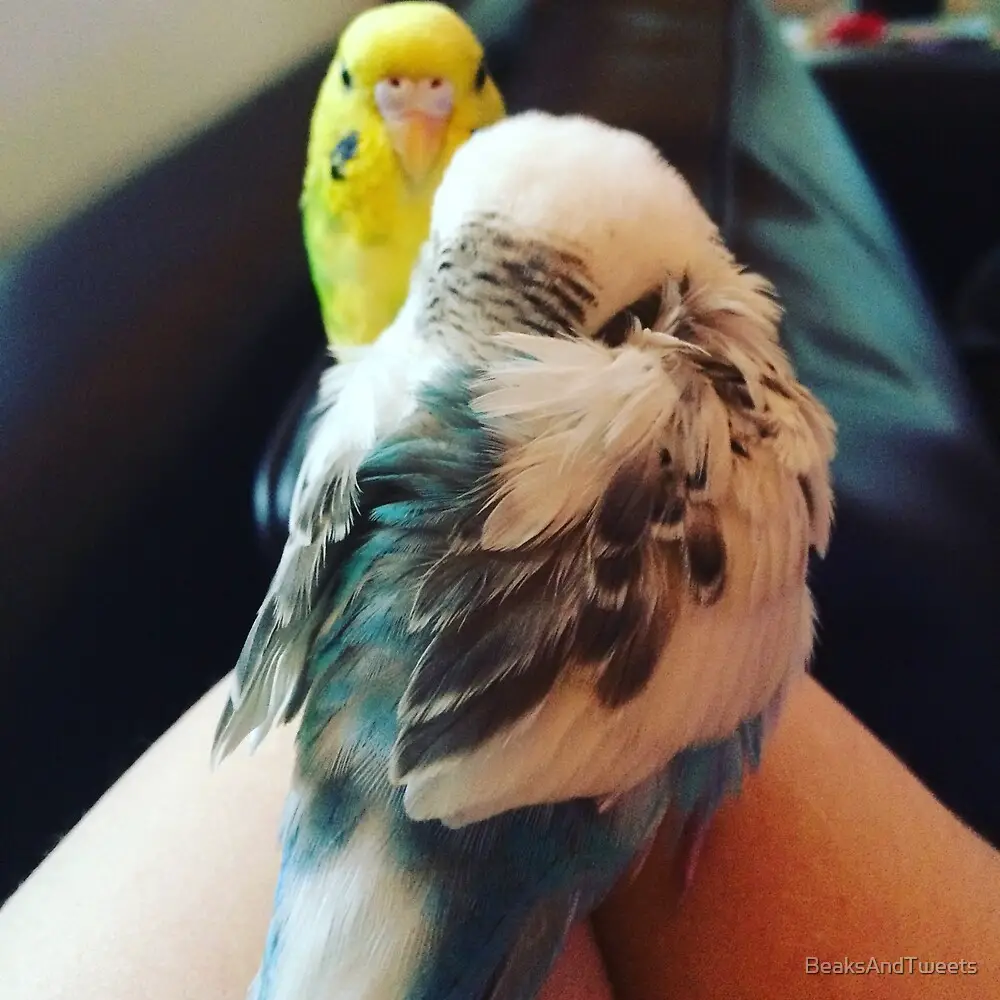
Contact your trusted bird-specialized veterinarian so that the bird’s illness will be diagnosed and treated.
- Follow the instructions of your bird’s doctor with great care.
- Keep your bird in an ideal environment that is not too hot.
- Remove unnecessary distractions from the cage of your recovering bird, like bells, mirrors, and toys.
- It might also help to increase the humidity inside your home. Talk to your trusted veterinarian about this and if this should be done.
- Ensure that your bird gets 10 to 12 hours of sleep.
- Feed your birds with food with high moisture content, like fruits and leafy greens.
- Ask for a recovering feeding plan for your pet bird.
